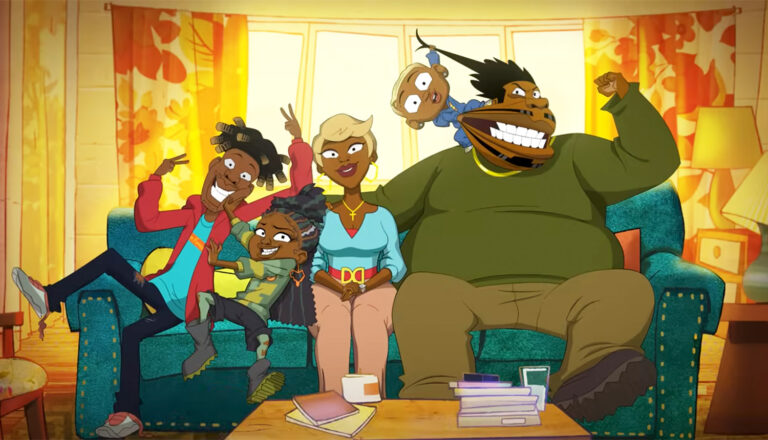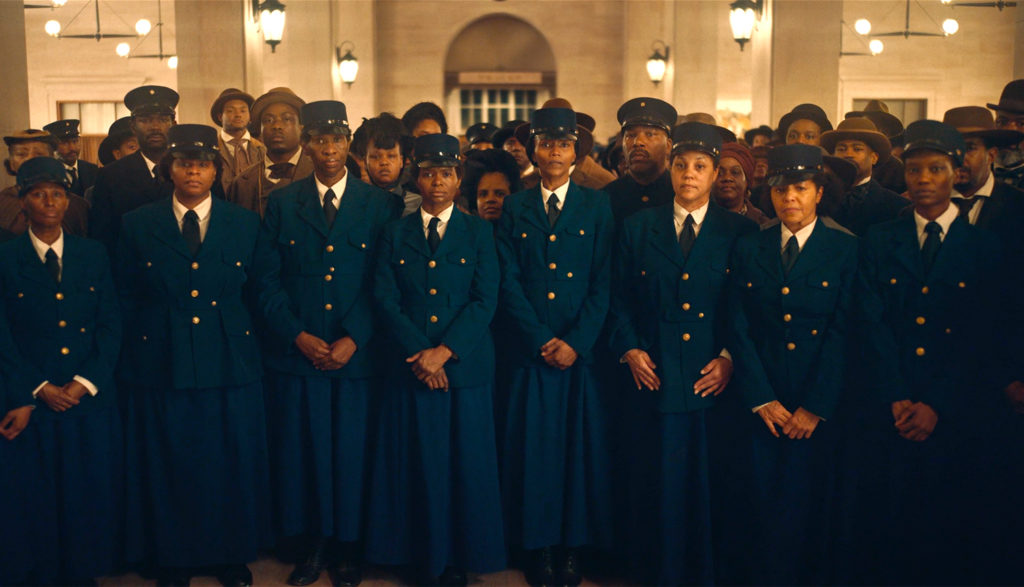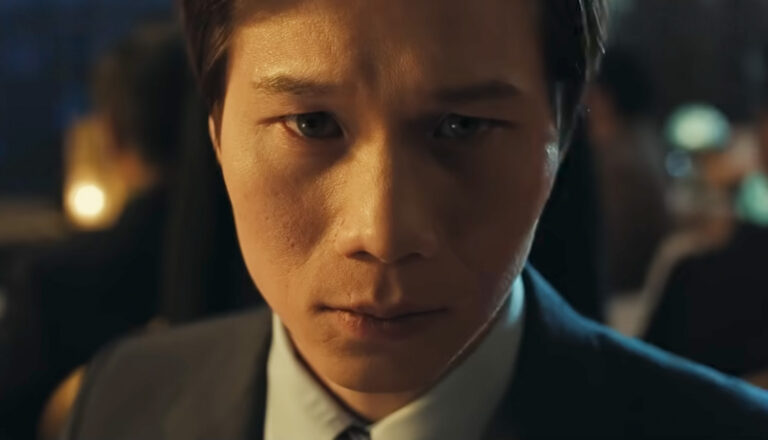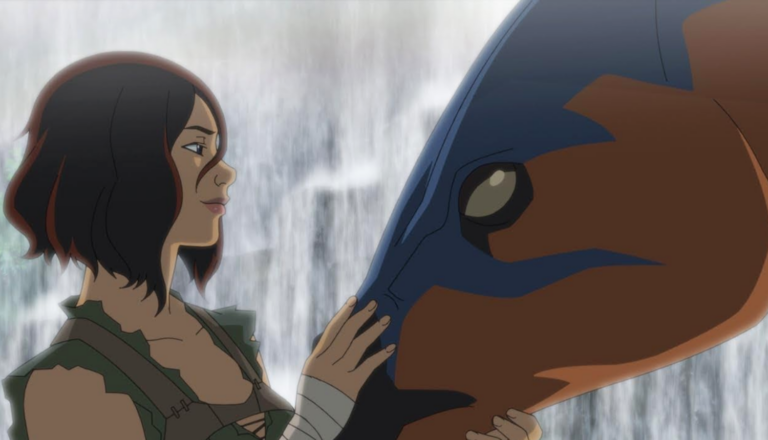
Good Times
Netflix takes a classic sitcom, Good Times, and turns it into a vulgar, violent, sexually-charged TV-MA show.

A tunnel winds deep through Southern earth, roofed by rock and floored by track. Through it snakes a locomotive—smoky, noisy, brash, hidden. It carries souls north, to safety and freedom. But not all make it. Danger and death lurk at every stop, every state. And behind, a man dressed in black rides to claim souls of his own.
Cora rides the railroad into unknown promise and peril. She follows her mother who, years before, left her behind. Left her to white masters who’d whip and beat and do far worse things to a young girl; left her to fellow slaves who treated her with suspicion and resentment.
Now she’s free, for the moment. Free, after a fashion. Free at last. But the man in black follows, looking for all runaway slaves but especially this one. See, Cora’s mother was the first slave—the only slave—to escape him.
Before Cora and her companion, Caesar, board the Underground Railroad for the first time, a man takes their names and a bit of their stories, and he offers some advice.
“Just look outside as you speed through and you’ll see the true face of America,” he says.
It’s a promise and a warning. And perhaps it’s something of a prophecy, too. The Railroad stops in each state as it winds its way north, and Cora stops, too. Sometimes she finds herself free and respected for a spell. Sometimes, she’s a fugitive from the moment she steps off the train.
Each state seems to have its own special way of dealing with runaway slaves—and sometimes, it doesn’t look that bad at first. She meets new people—friends, villains, a little of both. She experiences moments of relative comfort and instances of agony. She must fight for her life and freedom more than once. And even when the train passes the Mason-Dixon line, the dangers aren’t over.
Meanwhile, the man in black—Ridgeway’s his name—tracks her across the country, a freed black boy named Homer his only companion.
So what if the Railroad—this Railroad, anyway—never existed? This story carries deeper truths along its fictional tracks. And sometimes those truths are horrible to behold.
When Colson Whitehead was in fourth grade, he heard about the Underground Railroad in school. At the time, he thought it was a real railroad winding north. And while his teachers quickly corrected him, the image stuck.
A few decades later, Whitehead—now an author—published The Underground Railroad, a conduit through which young runaway slave Cora experiences different, telling, sometimes fantastical and often horrific race relations in each state she passes through.
It’s a pretty harrowing journey, naturally, and Amazon’s limited series adaptation has some big literary shoes to fill. (The book won the 2017 Pulitzer Prize for Fiction.) It does its best: It features dynamic Thuso Mbedu as Cora and Joel Edgerton as the relentless slave catcher Ridgeway, along with Whitehead’s own grounded, gritty, deceptively lyrical story.
But the story itself is filled with horrors—sights and sounds that scarred Cora and are designed to shock and sicken the audience as well. In the opening episode, a man is whipped nearly to death before being burned alive—and we see it all. Cora’s subjected to some incredibly inhumane treatment, physically and sexually, and the fact that she sometimes looks like a little girl heaps on the horror.
And a sidenote here: Just as Christianity was used in the 19th century to excuse slavery (even as abolitionists in the north used their faith to condemn it), so we see that dynamic here. Cora and Caesar’s owner in Georgia has committed Paul’s exhortation for slaves to obey their masters to memory—and he uses it to justify torture, rape and murder.
The graphic content here is not, in my estimation, gratuitous. There is purpose behind it all. Amazon wants us to see these horrors. Feel them. Experience them as much as possible through a screen. Because while the story is fictional, the inhumanity seen here was, according to history, far too real. But Cora, surely, wishes she never saw these horrors. And perhaps before we board this train, we should ask ourselves why we want to willingly expose ourselves to them.
Caesar plans his escape from the Randall plantation—owned by brothers Terrance and James, who’ve split the land between them—and asks Cora to go with him. Because Cora’s mother apparently successfully ran away, Caesar would consider Cora to be good luck.
“I ain’t nobody’s good luck,” Cora tells him. But after James, the slightly less odious brother, unexpectedly dies, leaving the entire plantation to the vile and sadistic Terrance, Cora feels that it might be time to leave.
The biggest push for Cora’s escape? The capture and murder of a slave called “Big Anthony,” who’s suspended from chains and whipped for hours as Terrance hosts a dinner party. (When Terrance asks one of his guests why he’s not eating, the guest says, “Rather peculiar, wouldn’t you say, to eat and drink while a man’s flesh is being ripped from his body.”) We see the horrific gashes on Big Anthony’s chest and abdomen (Passion of the Christ-level whip wounds) before Terrance calls in the rest of the plantation slaves around the man to witness him being burned alive. The flames lick and jump across the still-living victim, and for a couple of brief scenes, the viewer is shown Anthony’s view … blinking as the fire consumes him.
Terrance strikes a boy twice with his cane for spilling his wine. When Cora tries to protect him, she and the boy are whipped and left tied to the whipping post until morning. Men attack a group of runaway slaves, and one receives what may be an ultimately fatal blow to the neck with a hatchet. (The slaves are warned that “Every white man for a hundred miles wants to mount your heads on a fence” because of this act of bloody self-defense.) A man dies on the road, perhaps from a heart attack. Cora’s mother has her placenta drop from her after she gives birth (we see it hit the floor), and she staggers out of a shack, her white clothing covered in blood, to bury it.
A white foreman calls for Cora to be brought to his own cabin—and she must literally be pulled out of her own shack, so terrified is she of what awaits. We don’t see his mistreatment of her, but we do see him sleeping in bed as Cora sneaks out. Terrance shows an interest in Cora, too—but she leaves before anything happens. Terrance announces changes in sex after he takes over. “to ensure the propagation of the best stock,” he tells the slaves, “I will personally oversee the pairing and practices in the way of breeding.” He makes good on the threat: He watches as a man and a woman have sex (we see movements and a bit of bare backside). A female slave warns her male partner that he should have sex with her, insinuating that he has sex with other men. “If you don’t use your sex, Master will take it,” she says. “Take it right clean off.”
Terrance quotes the Bible frequently, reminding his slaves that Paul told them to obey their believing masters, as they’re all brothers in Christ. (He says this as he prepares to immolate Big Anthony.) After Cora’s pulled from her shed, a foreman demands women scrub the floors free of that “hoodoo black magic mess.”
People drink wine. Lots of racist, demeaning remarks are heard. Characters use the n-word at least 20 times. We also hear “b–ch,” “d–n,” “h—” and five misuses of God’s name (thrice with “d–n”).


Paul Asay has been part of the Plugged In staff since 2007, watching and reviewing roughly 15 quintillion movies and television shows. He’s written for a number of other publications, too, including Time, The Washington Post and Christianity Today. The author of several books, Paul loves to find spirituality in unexpected places, including popular entertainment, and he loves all things superhero. His vices include James Bond films, Mountain Dew and terrible B-grade movies. He’s married, has two children and a neurotic dog, runs marathons on occasion and hopes to someday own his own tuxedo. Feel free to follow him on Twitter @AsayPaul.

Netflix takes a classic sitcom, Good Times, and turns it into a vulgar, violent, sexually-charged TV-MA show.

While its protagonist might live a nuanced life, The Sympathizer’s problematic content can’t be described the same way.

Say hola once again to the iconic explorer in this faithful reboot of the children’s series.

Based on a popular video game, Ark: The Animated Series features hungry dinosaurs, bloodthirsty people and plenty of problems.